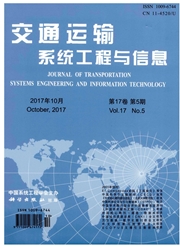

 中文摘要:
中文摘要:
本文采用1949~2012年的数据,应用向量自回归模型(VAR)对中国交通运输、经济增长和碳排放三者间相互影响的动态关系进行探讨.研究表明,经济增长和交通运输对碳排放的贡献存在“拐点效应”,即二者在短期内对碳排放的贡献表现出上升趋势明显的现象,然而从长远角度看,这一影响逐渐减弱;碳排放对经济增长的短期刺激效应较为突出,而长期方向上则表现为递减的现象,同时,在样本区间内,经济增长对交通运输业冲击的响应较为微弱,缺乏敏感性;经济增长和碳排放均对交通运输业的发展产生了不同程度的正向刺激作用.
 英文摘要:
英文摘要:
Appling VAR model with the time-series data during 1949 to 2012 period, this paper explores the dynamic relationship between transportation industry, economic growth and carbon emissions. The research results show that: Between the contribution of economic growth and transportation industry to carbon emissions, there is an "inflection point" effect, growth and transportation industry on carbon emissions which indicates that the impacts of both economic strengthen in the short term, while in the long-term scale, the impacts moderate progressively; The impacts of carbon emissions on economic growth are significant in the short term, however, in the long run the impacts decrease progressively, in the sample interval, the response of economic growth is faint under the shock from transportation industry; Both economic growth and carbon emissions can stimulate the development of transportation industry positively in varying degrees.
 同期刊论文项目
同期刊论文项目
 同项目期刊论文
同项目期刊论文
 期刊信息
期刊信息
